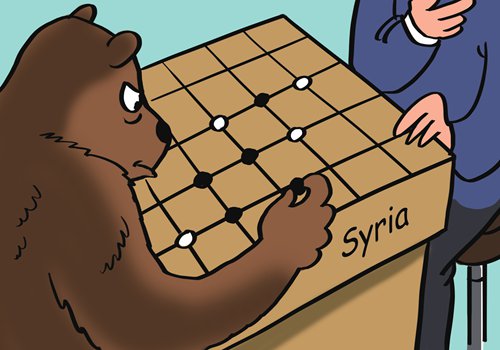
Illustration: Liu Rui/GT
Since the Syrian civil war broke out in 2011, Russia has been a staunch supporter of President Bashar al-Assad's government. Apart from political endorsement, economic assistance and weapons supply, Russia even joined the protracted warfare with airstrikes in 2015.
Given the fact that the Soviet Union let itself in a morass for intervening in the Afghan War (1978-92) in support of the communist government, many worry that Russia will repeat the Soviet history and get mired in an abyss because of involvement in the Syrian war.
Several Russian media outlets reported that seven Russian planes and an ammunition depot were destroyed by rebel shelling at Syria's Hmeymim air base on the last day of 2017, saying it was the single biggest loss for Russian military since Moscow launched airstrikes in the autumn of 2015.
The Russian Ministry of Defense responded that a mortar attack at the air base killed two Russian service personnel but denied the report that seven planes had been destroyed. The Kommersant newspaper and some other media outlets issued statements saying reports on destruction of aircraft was fake news.
Nonetheless, it is indisputable that Moscow's air base in Syria was attacked and the reaction of Russian media shows people's anxiety over the country's involvement in the Syrian war.
The war-torn landscape in Syria took a turn for the better since mid-2017 when most strongholds of the Islamic State (IS) were seized by Syrian government forces. In the current situation, the Assad government has an upper hand. Russian President Vladimir Putin announced partial military withdrawal from the war-ravaged country to show sincerity toward facilitating the nation's peace process. Thanks to Moscow's support, the Astana talks have made remarkable progress.
However, the December 31 attack may well reverse the process of troop-withdrawal. Russia will perhaps delay pulling its troops to prevent extremist forces isolated by attacks from again launching strikes. Putin has to be seen taking a firm stance against extremists prior to presidential elections. But a delay in troop pullout will probably affect Syria's peace process as the pullout by Russia is a demand made by the opposition. It will question the Syrian government's sincerity for peace talks once the Kremlin puts off withdrawal of troops.
Whether Moscow can withdraw its troops from Syria depends on whether the Assad government is able to control the domestic scenario and ensure Russia's national interests. It was once rumored that Putin agreed to Assad stepping down as a precondition to Syrian peace, but now it seems that Moscow will continue counting on the beleaguered leader to maintain its presence in the Middle East.
With Syrian government forces driving out IS extremists, Assad's position has been consolidated, which encourages the military to talk with the opposition.
Though the current situation favors the Assad government and Russia, there are a multitude of challenges. First, the deep-rooted causes for Syria's civil war have yet to be addressed. As Syrian refugees keep returning home from Europe, Assad has to turn his focus from fighting the IS to consolidating his regime and rebuilding the war-torn nation. It is expected that the civil war will unfold for some time in the future since the unsolved issues blighting political transparency and economic development give opposition factions time to survive.
In addition, the rivalry between Russia and the West has further complicated the war. Both eye their own goals by supporting the Syrian government army and the opposition respectively. That Assad could take the wind through 2017 benefits from a contracted US force since Donald Trump's inauguration as well as Europe's grumbles about massive influxes of refugees.
It is hard for Russia to withdraw its troops from Syria and at the same time ensure its national interests and keep propping up the pro-Kremlin Syrian government.
Now it appears that Moscow has realized its initial objectives - stabilizing the Assad regime, bolstering the Syrian government army, gaining a firm foothold in the Middle East, rebuilding its influence as a major power and opposing Western sanctions.
Syria has seen relative stability. Russia has forged close ties with Syria and neighboring Iran and Iraq, largely thwarting the US and Europe in the Middle East. From a strategic perspective, Russia's involvement in the Syrian civil war helps it restore its influence in the Middle East which is undergoing a geopolitical upheaval.
By extensive intervention in the Syrian war, Moscow has reaped the most benefits at the lowest cost. Even US allies including Saudi Arabia, Turkey and Iraq have started seeking cooperation with Russia. Russia's move in Syria demonstrated its diplomatic might as a major country and its potential to become a power exercising regional influence.


